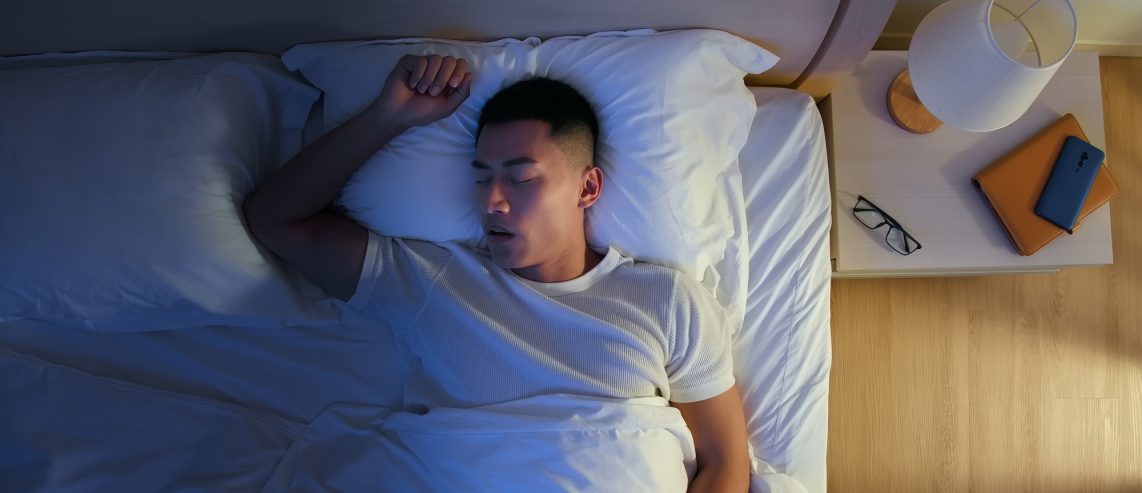You know that snoring disrupts your sleep (not to mention that of your partner). And sleep deprivation can lead to morning headaches, daytime sleepiness, and a lack of focus. But at its worst, snoring is a sign of sleep apnea, a more serious condition.
Here’s what you need to know about this common problem — and how to stop snoring.
What Causes Snoring?
Snoring begins when you’re asleep and the muscles of your soft palate, tongue, and throat relax. As you breathe, your soft palate and uvula vibrate against the back of your throat. The vibration produces the familiar “sawing logs” sound of snoring.
According to the American Sleep Association, nearly half of U.S. adults report snoring. It’s especially common among older people, who have weaker airway muscles.
You’re also more likely to snore if you:
- Are overweight.
- Are a man.
- Sleep on your back.
- Are pregnant.
- Smoke cigarettes.
- Drink alcohol close to bedtime.
Never Miss a Beat!
Subscribe to Our HealthBeat Newsletter!
Thank you for subscribing!
You can now select the specific newsletters you'd like to receive.
You are already subscribed.
Subscribe to more newsletters in our email preference center.
Sorry, an error occurred. Please try again later.
Get Healthy Tips Sent to Your Phone!
When Does Snoring Become a Serious Problem?
Although many people snore now and then, chronic snoring can lead to a diminished quality of life. You may never feel fully rested, you fall asleep during the day, and you suffer from “brain fog.” You may have relationship problems if you’re keeping your partner awake at night.
If your snoring is the result of sleep apnea, however, you may develop serious physical problems.
Sleep apnea is a condition wherein your breathing stops and restarts many times over the course of a night’s sleep. If you wake up gasping for air, you may have apnea. Doctors associate sleep apnea with high blood pressure, diabetes, and heart disease.
Sleep apnea is more serious than regular snoring, and you should see a doctor for treatment.
Snoring Remedies
Many people wonder how to stop snoring. Fortunately, there are tactics you can try to reduce snoring.
Lifestyle changes
Your doctor may recommend starting with simple lifestyle tweaks to reduce snoring. You can:
- Lose weight if you need to. Being overweight is a common cause of snoring.
- Sleep on your side instead of your back. You’re more likely to snore on your back.
- Try nasal strips. Over-the-counter nasal strips use tension to open the nasal passages. They stick easily onto your nose with adhesive.
- Don’t drink alcohol before bedtime. Alcohol relaxes the throat muscles, which increases snoring.
- If you smoke, try to quit or cut back. Smoking cigarettes can make snoring worse.
- Clear your nasal passages. Chronic or occasional nasal congestion can exacerbate snoring because you breathe through your mouth instead of your nose.
Medical remedies
If lifestyle changes aren’t helping, your doctor may recommend another line of treatment. They will examine your mouth and nose and possibly order a sleep study (see below).
Based on the results of the study, your doctor may recommend:
- A continuous positive airway pressure (CPAP) machine. This machine has a mask that fits over your face. It provides a gentle flow of air to keep your airway open while you sleep.
- Mouth guard. This device prevents you from grinding your teeth. Doctors believe there is a possible connection between teeth-grinding and sleep apnea.
- Mandibular advancement device. This plastic device pulls the lower jaw and tongue forward to help keep the airway open during sleep.
- Tongue-retaining device. This device uses suction to keep the tongue forward, so it doesn’t block your airway.
- Surgery. As a last resort, your doctor may recommend surgery to reduce snoring. They may remove excess tissue from the soft palate or insert an implant to stiffen the soft palate. Both lead to reduced movement of soft tissue in the throat and less snoring.
What to Expect From a Sleep Study
Before treating your snoring, your doctor may order a sleep study. It’s a noninvasive test that allows doctors to measure activity in your brain and body while you sleep. It may take place at a sleep clinic or hospital.
A technician will place electrodes on your scalp, face, and legs, and you’ll go to sleep in a private room. When you’re sleeping, an EEG will monitor your sleep cycles. It will record eye movements, the amount of oxygen in your blood, heart and breathing rates, and your body movements.
In the morning, you’ll go home. Your doctor will evaluate the results of the study and schedule a follow-up visit. They will recommend treatments, if needed, based on the results of the sleep study.
Sources
The Sleep Foundation, Sleep Studies, Link
National Library of Medicine, Snoring, Link
National Heart, Lung, and Blood Institute, What Is Sleep Apnea? Link
American Sleep Association, Sleep and Sleep Disorder Statistics, Link
Merck Manual Professional Version, Snoring, Link
American Sleep Association, How to Stop Snoring, Link
About UPMC
Headquartered in Pittsburgh, UPMC is a world-renowned health care provider and insurer. We operate 40 hospitals and 800 doctors’ offices and outpatient centers, with locations throughout Pennsylvania, Maryland, New York, West Virginia, and internationally. We employ 4,900 physicians, and we are leaders in clinical care, groundbreaking research, and treatment breakthroughs. U.S. News & World Report consistently ranks UPMC Presbyterian Shadyside as one of the nation’s best hospitals in many specialties and ranks UPMC Children’s Hospital of Pittsburgh on its Honor Roll of America’s Best Children’s Hospitals. We are dedicated to providing Life Changing Medicine to our communities.
